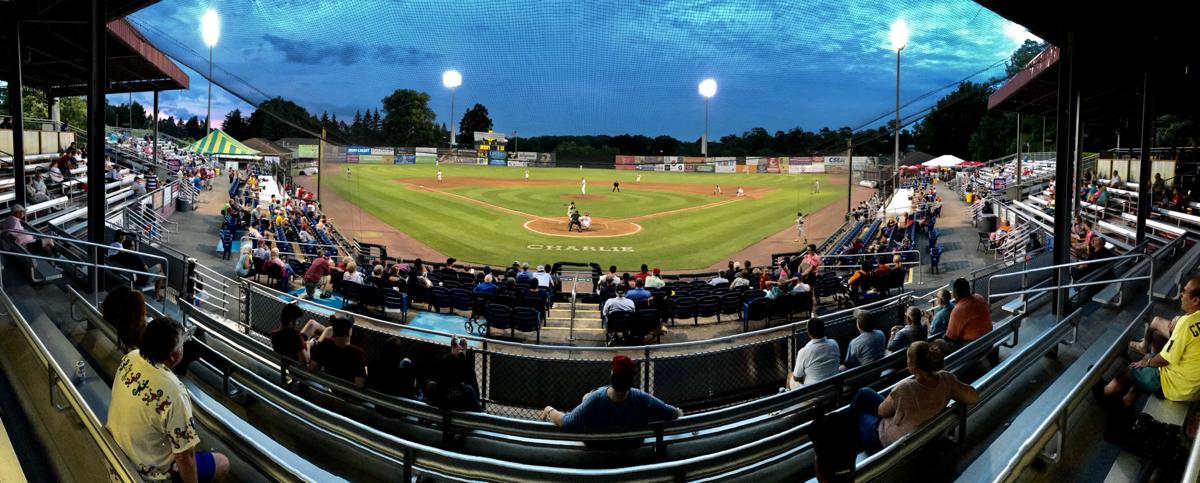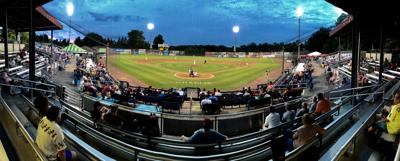AUBURNÌý— The overall cost of a project to install turf at Falcon Park and turn the stadium into a multi-use facility is estimated to be around $2.1 million.Ìý
Thursday during the Auburn City Council meeting, City Manager Jeff Dygert said that $2 million mark will include not only the turf installation, but also improvements so the facility can be utilized up to 10 months out of the year, such as insulating the clubhouses.Ìý
The city council is expected to award the construction contract for the bulk of the project to Cunningham Excavation out of Cazenovia during its next meeting. That company had the , at $1.425 million. City Superintendent of Public Works Mike Talbot said around $1.24 million of that will go toward installing turf, while the remaining $185,000 will go toward padding the outfield wall and upgrading to a higher quality of turf. In July, the city council approved a $3 million bond to finance the project. Dygert said he is confident the entire bond will not be used for this project.Ìý
People are also reading…
The council is also expected to vote on a contract with Cayuga Community College that would give the institution the right to rent Falcon Park for several of its sports teams in exchange for reimbursing the city for the bond.Ìý
"The rental payments the college would be paying to the city would actually take care of the debt service on the improvements," Dygert said. "The city itself is actually not on the hook for those payments."Ìý
Over the life of the 20-year contract, which the college's board of trustees approved Wednesday, the college will pay the city just over $6 million. That amount will not only cover the cost of the turf-installation project, but also operating and maintenance costs the city will incur going forward.Ìý
"We think it's a fair deal, we think it's a great deal and our trustees and leadership support it," CCC President Brian Durant said during the meeting, adding the college was looking at a project to build such a facility on its campus that would have cost $15 million, not to mention long-term maintenance expenses.Ìý
Though the facility will be getting more use, Dygert said the cost of utilities is not expected to increase much. The city will be saving money on water because there will no longer be grass to maintain and the stadium is getting new energy-efficient LED lighting.Ìý
The contract includes a termination clause, which states if the college decides to back out of the agreement before the 20 years, it would still have to pay the city through the end of the 20-year agreement. Durant said he does not foresee that happening.ÌýÌý
"We believe firmly these (athletic) programs are well established," Durant said.ÌýÌý
Construction is expected to begin soon after the council votes to award the construction contract and approve the agreement with the college next Thursday. Dygert said the plan is to have the work complete before the spring baseball season, so the CCC men's baseball and women's softball teams can use the field. The project must be completed before the Auburn Doubledays begin the 2019 season during the early summer.Ìý
This project will not only benefit the college, but the city and Doubledays as well, Dygert said. Since the stadium will be used additional months of the year, more people will be seeing the Doubledays' advertising, so the team may be able to charge advertisers more for space at the park. The city will also be able to host other sporting and entertainment events at the park, such as concerts.Ìý
In other newsÌý
• The council unanimously voted to lend its support to a the Owasco Lake Watershed Management Council plans to send to the state Department of Environmental Conservation regarding environmental rules for farms.Ìý
AUBURN — New permits governing large livestock farms in New York being developed by the stat…
Recently, the DEC opened a public comment period so people could give their input on the agency's new Clean Water ActÌýConcentrated Animal Feeding Operations, or CAFO, permits.ÌýA state Supreme Court judge ruled in April that the DEC had to change its CWA CAFOs, which the department updated in 2017, because they violated federal laws. However, there is another type of CAFO permit administered by the DEC — the Environmental Conservation Law CAFOÌý—Ìýand the judge's ruling for the public comment period did not apply to those permits.Ìý
The watershed council's letter urges the DEC to open a public comment period for the ECL CAFOs because only 21 out of nearly 500 CAFOs in the state are governed by the CWA CAFOs, and none of those are in Cayuga County.Ìý
City councilors agreed that the state government needs to be doing more to reduce pollution and keep water bodies clean, which councilors said won't happen until there is more public outcry.Ìý
"One of the things I think is missing, and has been missing since I became a city councilor, on this specific topic is the public," Councilor Debby McCormick said. "We've been talking about it in council since the microcystins have gotten into our drinking water, but we don't see the public outcry like we should, I think. I've been to city council meetings where potholes got more public attention than the drinking water has."
Staff writer Natalie Brophy can be reached at (315)282-2239 or natalie.brophy@lee.net. Follow her on Twitter .

















